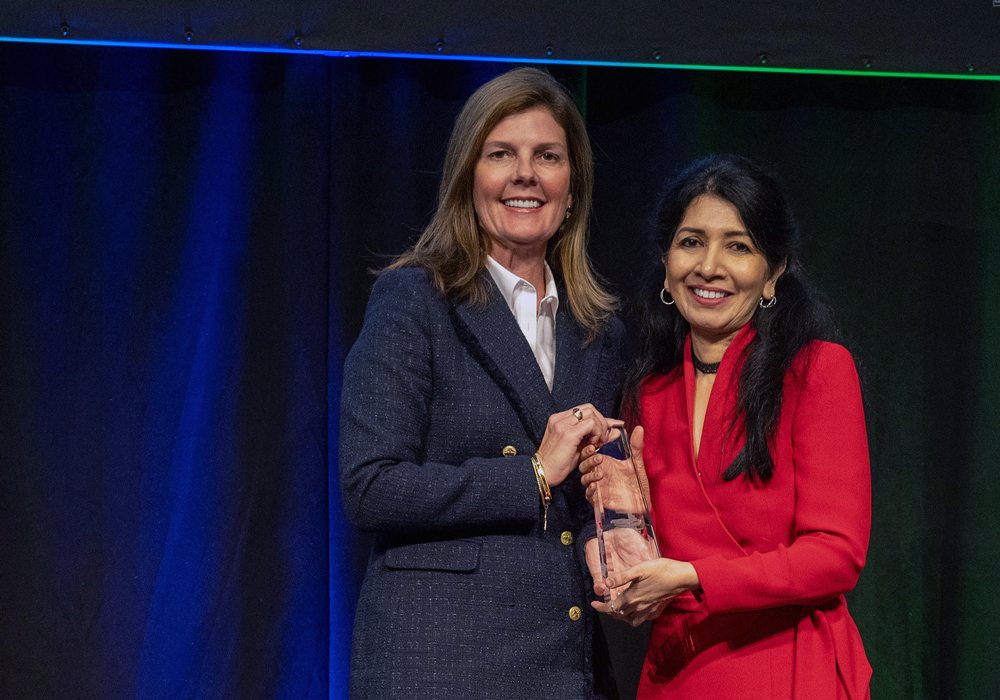Described as a visionary leader and a passionate educator, Meera Narasimhan, M.D., has been at the forefront of telehealth in South Carolina. Her passion for addressing disparities in health care delivery and her advocacy for mental health awareness have led Narasimhan to a leadership role in medicine in the state.
A graduate of Gandhi Medical College in India, Narasimhan also completed an internship at the school before a psychiatry internship at Columbia College in New York. Following her residency and fellowship appointments at Yale, she began her career at the University of South Carolina School of Medicine Columbia as director of Biological Research in 2004.
Narasimhan’s enthusiasm for tackling issues related to equal health care access for all is impossible to miss. Her work in this area has led to many accolades, including the Telehealth Community Innovator Award in 2017 and the State Telehealth Champion Award, which she received last fall at the Annual Telehealth Summit of South Carolina.
“It has been a blessing to be involved in the telehealth space for over a decade in our state and nationally,” Narasimhan says. “It has been truly gratifying to have played a small role in addressing health inequities in our great state via telehealth.”
“While we have made tremendous progress in medicine in the 21st century in understanding the biological underpinnings of disease and cutting-edge treatment advances, we continue to grapple with disparities in health care delivery to our communities.”
Narasimhan is well-deserving of the prestigious award, USC President Emeritus Harris Pastides says: “She’s been a pioneer in what used to be called telemedicine, and now we call it telehealth, and I truly believe the people of South Carolina are way better off because of her.”
Narasimhan has held several leadership roles in her career. She serves as the chair of Psychiatry in the Department of Neuropsychiatry and Behavioral Science at Prisma Health and USC’s School of Medicine Columbia. She is also the special advisor for health innovations for university President Michael Amiridis.
The School of Medicine Columbia has been involved in remote health care — telehealth — since the late 1990s, and during her time at the school, Narasimhan has continued work in health care delivery and technology advances in the area.
“It has been truly gratifying to have played a small role in addressing health inequities in our great state via telehealth.”
“Our School of Medicine has been a pioneer in the state in leading statewide public-private academic partnership efforts to improve access to care to the underserved,” Narasimhan says. “These efforts have continued to added fervor over the years to make health care accessible to all South Carolinians. I am grateful to the numerous partners we have worked with over the years to make telehealth sustainable and successful. Alone we can do little, together we can do much.”
She and her team have received numerous grants from organizations such as the National Institutes of Health, the National Institute of Mental Health, the Patient-Centered Outcomes Research Institute and the Substance Abuse and Mental Health Services Administration along with other foundations to address the many facets of telehealth sustainability.
In addition to her work at the School of Medicine Columbia and Prisma Health, Narasimhan is also on the American Psychiatric Association, Steering Committee on Telehealth and the advisory council of the S.C. Telehealth Alliance, which is a collaborative statewide organization that works to expand telehealth services across South Carolina. Murrell Smith Jr., the speaker of the S.C. House of Representatives, works alongside Narasimhan on the advisory council. In reference to her Telehealth Champion Award, he emphasized her passion for her work in telehealth.
“If you look back to where we were, 10-12 years ago, and where we are now, we’ve moved light years [in telehealth in our state], and it’s because of her continued and persistent advocacy that we need to service the areas of the state and our citizens, regardless of where their ZIP code is,” he says.
Adding that Narasimhan has been steadfast in her determination and dedication to advance telehealth, Smith says, “Meera is the one constant in that process. Always, through every step of the way that we’ve advanced telehealth in our state, she has been a part of that discussion.”
Narasimhan foresees continued growth in telehealth in South Carolina, and she will use her passion for equitable health care to bring awareness for its access and usefulness.
“While COVID saw an exponential growth in telehealth in our state,” she says, “I do believe that other innovative technologies such as artificial intelligence, health apps and virtual reality will be used to complement and augment telehealth delivery platforms to help address the growing health care needs and shortage of providers, while reducing the cost of care.”
